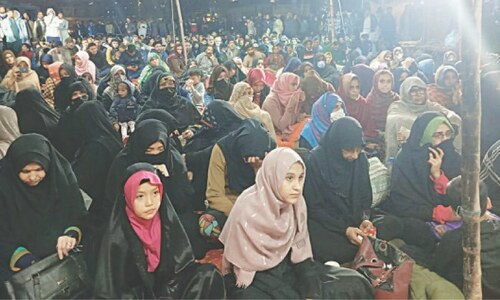KARACHI, Oct 25: Discussions about the effect colonialism has had on non-western and specifically Asian art dominated at ‘The anxious century: discourses waiting to be born,’ a two-day art criticism seminar that kicked off on Saturday at the Goethe-Institut here.
Various experts from Pakistan as well as abroad presented papers and participated in the discussions that not only dwelled on the impact of colonialism on the art of the colonized, but also discussed how new identities in art could be forged independent of colonial baggage.
The event has been organized by the Goethe-Institut Pakistan and NuktaArt, a local contemporary art magazine.
Ziaul Karim, the editor of Jamini, an arts quarterly from Bangladesh, made an impassioned plea for Asian artists to remain vigilant of the colonial influence.
“Most western thinkers say (modern) Asian art is a poor imitation of what was happening in the West. There has been a great politics of silence about Asian art for the last 100 years. Globalization is the new imperialism now. Even Zainul Abedin was affected by the colonial attitude,” he said, referring to the respected Bangladeshi artist as he showed slides of some of the late painter’s important works.
“We must remain vigilant of colonial influence. We need to challenge the dominance of western art. We need to talk back to western hegemony,” said the art critic.
Professor Nazish Ataullah, principal of the National College of Arts, Lahore, gave an interesting history of art schools in the subcontinent in her presentation on the development of the miniature at the NCA. She said that in the 19th century, the British had set up three art schools in India, in Madras, Calcutta and Bombay. Lahore’s Mayo School of Arts – as the NCA was originally called – was the fourth.
Prof Ataullah said the British wanted to export the idea of an art school and museum built next to each other to their colonies. At such schools, the technology of the times was promoted, as were regional arts and crafts, while there was an emphasis on drawing. Lockwood Kipling – father of Rudyard – was the first principal of the Mayo school.
She said that most of the students were the sons of local craftsmen and when Percy Brown became principal of the institution, he laid major emphasis on miniature painting, adding that “a token part of the curriculum was devoted to Indian art.” Partition, Prof Ataullah observed, dealt a severe blow to the school as many of the ustads left for India.
Emphasizing the fact that Pakistan had now become known the world over for its miniatures, she illustrated the evolution of the form by displaying slides of such acclaimed artists as Zahoor-ul-Akhlaq, as well as the work of modern artists, many of whom make pointed socio-political comments through their art.
She ended her presentation by asking if art was a commodity and if educational institutions were promoting its status thus.
Renowned architect Arif Hasan spoke on the changing value system, asking if it was being reflected in modern art. Sharing the result of several interviews he had conducted with everyday people in Karachi, he said very important changes were occurring in the value system of society, which were barely being discussed in the media. He said this change was discussed to an extent in theatre, but it was more of an attack on traditional values.
“New societal values are needed. Can art help in defining this change? It is necessary to associate with this change,” he said.
German journalist and writer Heinz-Norbert Jocks said that the West makes its own standards the yardstick for everything and that perhaps there is a need for a history of perception.
Several other papers on various sub-themes of the seminar were also presented.
The event will wrap up on Sunday with presentations from experts from Iran, Bangladesh and Sri Lanka, as well as Pakistan, along with a panel discussion on art archives in South Asia.














































Dear visitor, the comments section is undergoing an overhaul and will return soon.